12 Best CMS for Small Business Options in 2025 (Reviewed)
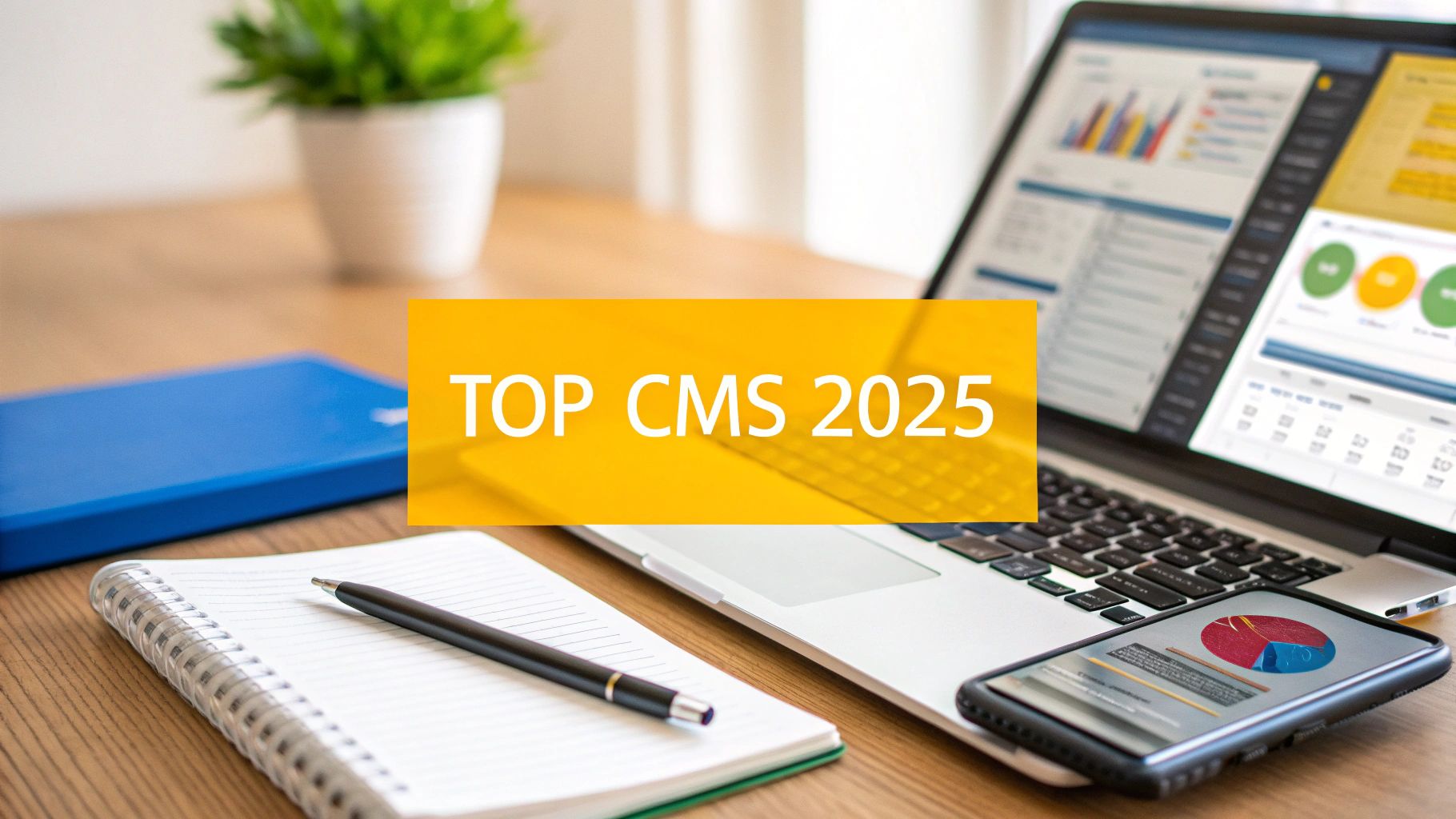
In 2025, a powerful website is non-negotiable for growth. But with so many options, finding the best CMS for small business can feel overwhelming. A Content Management System (CMS) is the engine behind your site, determining how easily you can create, manage, and scale your digital presence without needing to code everything from scratch. This guide cuts through the noise.
We move beyond generic feature lists to provide a practical, in-depth analysis of the top platforms. Each review dives into real-world use cases, honest limitations, and critical factors like ease of use, scalability, and total cost of ownership. You'll find screenshots and direct links to help your evaluation.
Whether you're a startup launching a simple service site, a product manager scaling an e-commerce store, or a marketing team building a content-rich blog, this resource will equip you to make an informed decision. Our goal is to help you select a platform that aligns with your specific business goals and technical comfort level. To gain further insights and compare additional top platforms, you can also explore other best CMS for small business options that offer different perspectives. This list will help you choose a digital foundation that supports your business for the long term.
1. Shopify
Shopify stands as a premier contender for the best cms for small business, especially for those centered around product sales. It's a fully hosted, all-in-one ecommerce platform designed for simplicity and power, allowing entrepreneurs to build and launch a professional online store with minimal technical expertise. Its core strength lies in its streamlined setup and conversion-optimized checkout process, which is critical for turning visitors into customers.

The platform integrates sales channels seamlessly, letting you sell directly on social media platforms like Instagram and TikTok, as well as through its robust Point of Sale (POS) system for physical locations. While monthly plans start at a reasonable price point (Basic Shopify is around $29/month), business owners should budget for potential extra costs from premium themes and specialized apps.
Key Considerations
- Best For: Product-based businesses, from solo artisans to growing retailers, who need a scalable, secure, and fast-to-launch online store.
- Not Ideal For: Content-heavy sites like blogs or portfolios that don't have a primary focus on ecommerce.
- Pricing: Monthly subscription plans plus transaction fees if you don't use Shopify Payments.
Shopify's user-friendly interface and award-winning 24/7 support make it accessible for beginners, while its vast app ecosystem provides endless customization for scaling businesses. Integrating your storefront into a larger promotional strategy is crucial; learn more about building a successful Shopify marketing plan to maximize your reach.
Website: https://www.shopify.com
2. Wix
Wix has carved out a niche as a highly intuitive and flexible option when considering the best cms for small business, particularly for service-based companies, artists, and restaurants. It's a fully hosted platform celebrated for its user-friendly drag-and-drop editor and recently enhanced AI-driven site-building tools, which make creating a visually stunning website accessible to absolute beginners. The platform empowers users to design and launch a professional site without touching a single line of code.
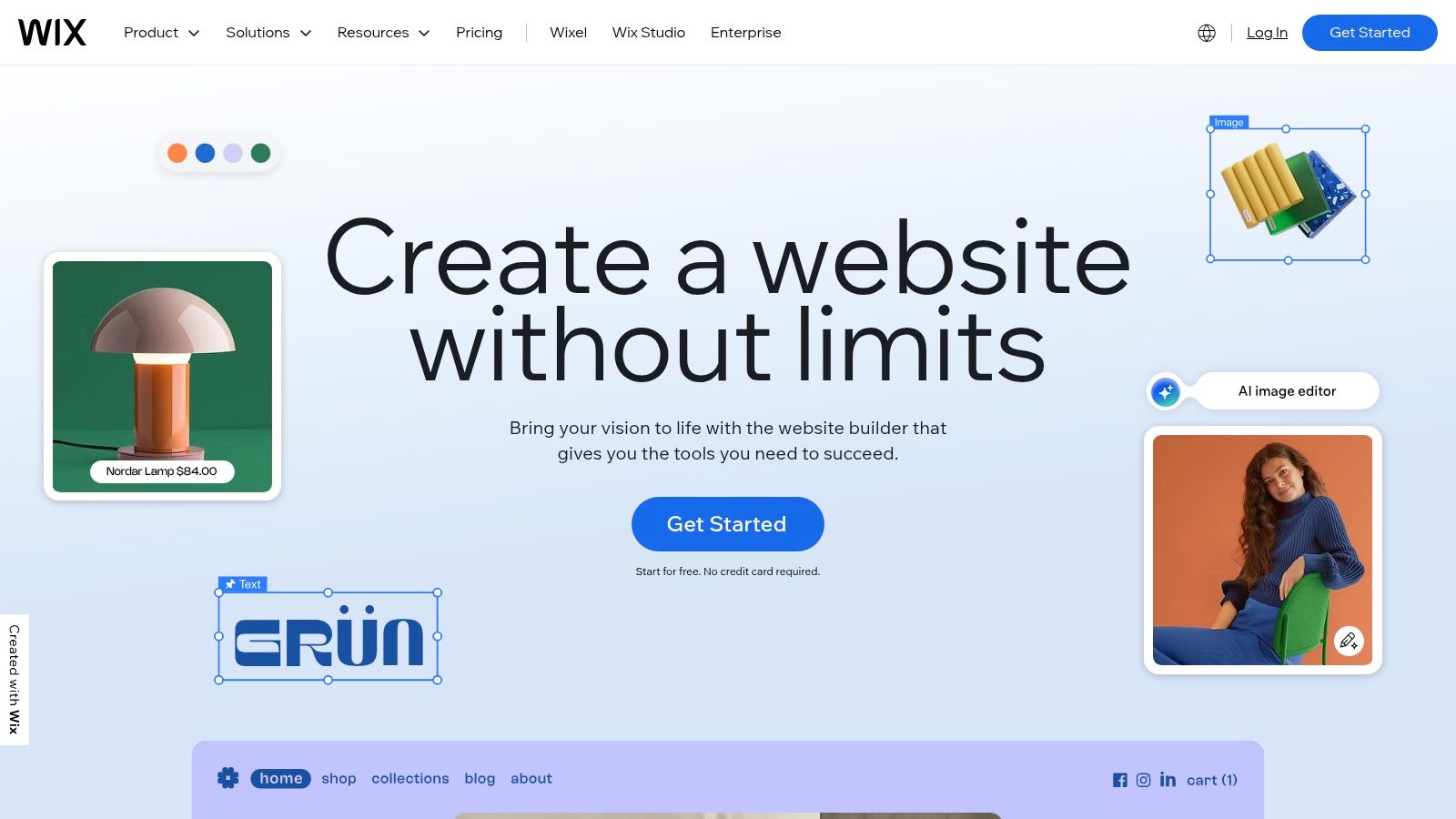
Its strength lies in creative freedom and a massive library of professionally designed templates for nearly every industry. The Wix App Market further extends functionality, offering integrations for everything from online bookings and event management to advanced marketing tools. While a free plan exists for testing, serious businesses will need a premium plan (starting around $16/month) to connect a custom domain and remove Wix ads. Users should be mindful that costs can escalate with premium apps.
Key Considerations
- Best For: Service providers, creatives, and small businesses wanting maximum design control and built-in tools for appointments, blogging, and portfolios.
- Not Ideal For: Users who may want to migrate their site to a different host later, or those needing deep, complex database functionalities.
- Pricing: Free plan available; premium plans are subscription-based. Costs can increase with certain App Market additions.
Wix's all-in-one approach, combining hosting, design, and business management tools, makes it a compelling choice for entrepreneurs who want to manage their entire online presence in one place.
Website: https://www.wix.com
3. Squarespace
Squarespace is a dominant force when considering the best cms for small business, particularly for those prioritizing visual appeal and brand consistency. It's a fully hosted, all-in-one platform celebrated for its award-winning templates and intuitive drag-and-drop editor, Fluid Engine. This focus on design allows service providers, creatives, and retailers to build a polished, professional website without needing to write a single line of code.
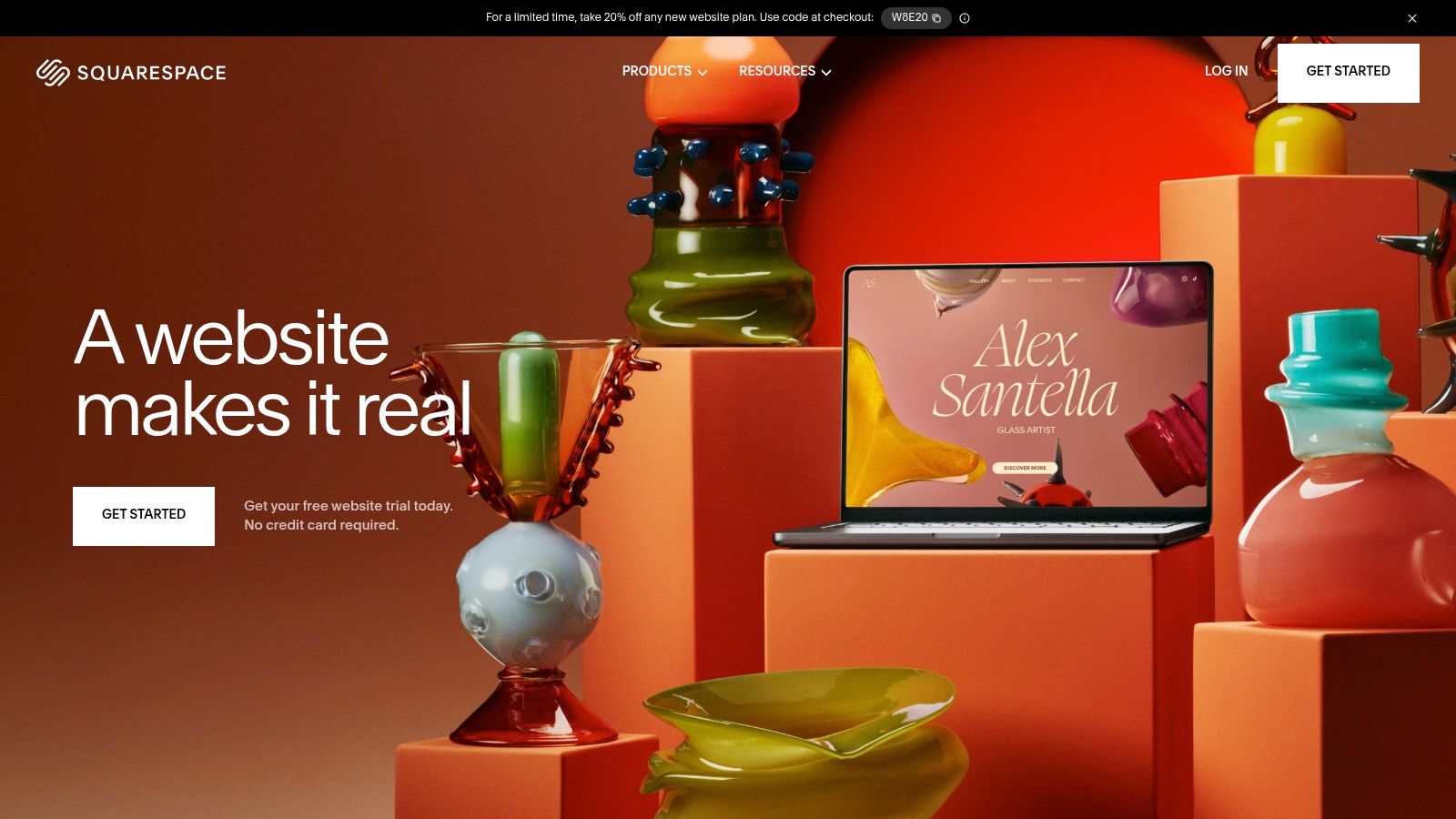
The platform has expanded well beyond a simple site builder, integrating robust tools for commerce, appointment scheduling, and email marketing directly into its ecosystem. While it lacks a free plan, its pricing tiers are competitive, offering a unified solution that handles hosting, security, and support. Users should be mindful that transaction fees apply on lower-tier commerce plans, and some advanced features are reserved for pricier subscriptions.
Key Considerations
- Best For: Service-based businesses, artists, photographers, and boutiques needing a stunning portfolio or online store with integrated booking and marketing tools.
- Not Ideal For: Businesses requiring highly complex custom functionality or those looking for the cheapest possible entry point.
- Pricing: Monthly or annual subscription plans. Transaction fees may apply depending on the plan chosen.
Squarespace’s strength lies in its simplicity and curated experience. The all-in-one approach means you don't have to worry about plugins or security updates, allowing you to focus on creating content and growing your business with a beautiful and highly functional website.
Website: https://www.squarespace.com
4. WordPress.com
WordPress.com offers a streamlined, fully-hosted version of the world's most popular CMS, positioning itself as a strong candidate for the best cms for small business needing simplicity without sacrificing power. It handles all the technical heavy lifting, including hosting, security, and automatic backups, allowing business owners to focus purely on content and growth. This makes it an excellent entry point for those intimidated by the server administration required for the self-hosted WordPress.org.
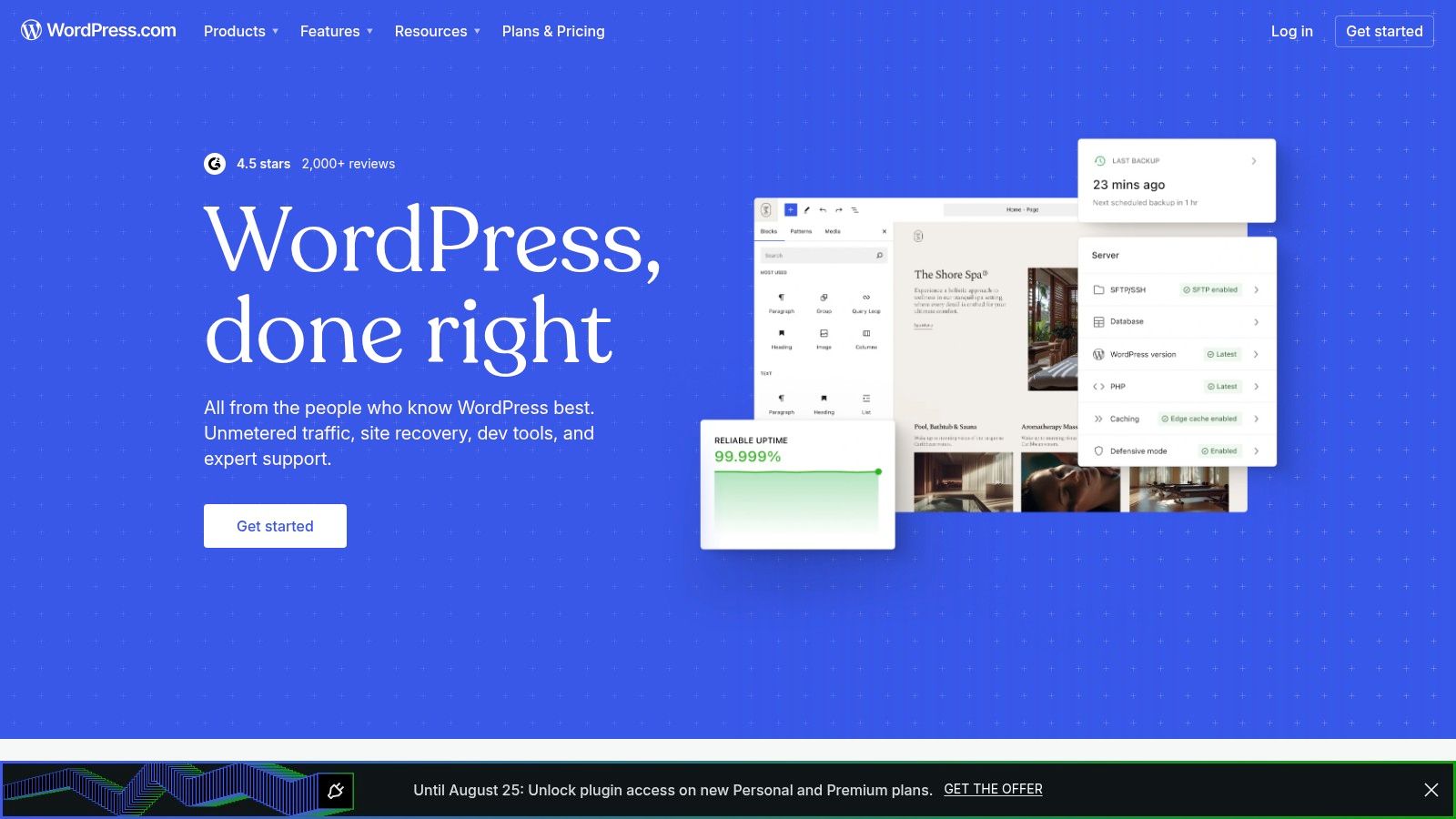
The platform scales effectively from a simple blog or portfolio to a full-fledged ecommerce store via WooCommerce integration on its higher-tier plans. With features like a new AI site builder to generate layouts and text, it lowers the barrier to creating a professional web presence. While a free plan exists, serious businesses will need to upgrade to a paid plan (starting around $4/month, billed annually) to access custom domains, plugins, and advanced features.
Key Considerations
- Best For: Service-based businesses, bloggers, and consultants who want the power of WordPress with managed hosting and support.
- Not Ideal For: Businesses on a tight budget needing full plugin and theme customization, which is restricted to higher-priced plans.
- Pricing: Tiered monthly or annual subscription plans, with ecommerce and advanced features locked behind Business or Commerce tiers.
WordPress.com provides a secure and high-performance environment that's perfect for executing a robust content strategy. Mastering various content marketing techniques is key to leveraging the platform's blogging and SEO capabilities to attract and engage your target audience.
Website: https://wordpress.com
5. WordPress.org (self-hosted)
WordPress.org represents the pinnacle of flexibility, making it a powerful contender for the best cms for small business for those who want total control. This is the self-hosted, open-source version of WordPress, meaning you install the free software on your own hosting account. Its greatest strength lies in its limitless customization potential, powered by an ecosystem of over 50,000 plugins and countless themes that can adapt to any business need imaginable.
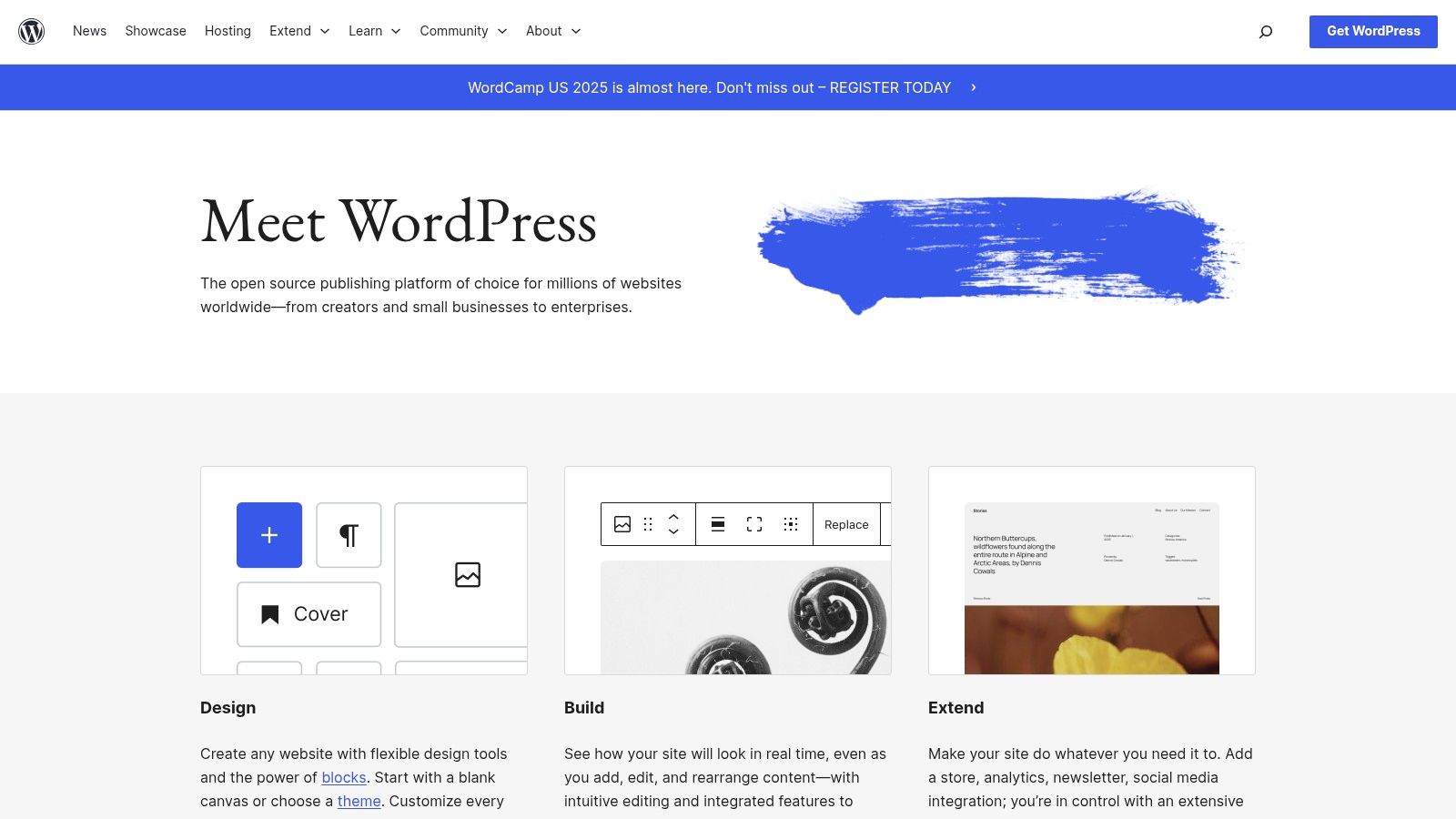
Unlike hosted builders, you are in complete command of your website's data and functionality, with no platform lock-in. While the core software is free, you must budget for a domain name, web hosting, and potentially premium themes or plugins. This approach does come with a steeper learning curve, as the user is responsible for security, updates, and backups.
Key Considerations
- Best For: Businesses wanting full creative and technical control, from complex service sites to highly customized blogs and membership platforms.
- Not Ideal For: Absolute beginners or business owners who lack the time or desire to manage technical maintenance and security.
- Pricing: The CMS software is free, but requires paid hosting (typically $5-$30/month) and a domain name.
WordPress.org gives you the freedom to build precisely what you envision without restrictions. Mastering the platform is a key part of leveraging professional web development for small businesses to create a truly unique online presence.
Website: https://wordpress.org
6. Webflow
Webflow is a powerful hybrid, blending a visual no-code website builder with a flexible CMS, making it a top choice for design-focused small businesses. It empowers users to create highly custom, professional websites without writing a single line of code, yet it exports clean, semantic HTML and CSS. This approach gives you the creative freedom of a design tool with the structural integrity of a traditional development environment, a combination rarely found elsewhere.
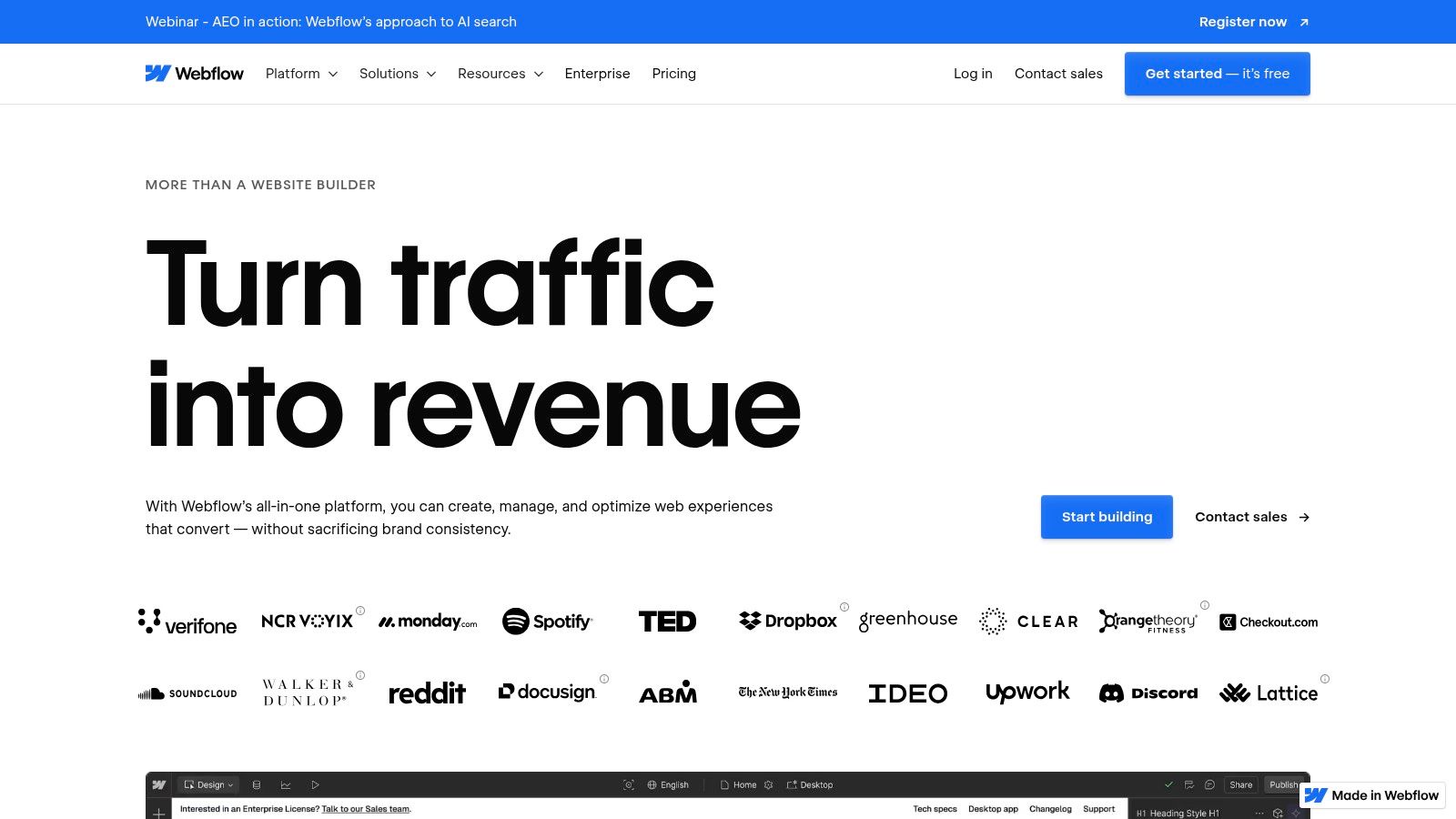
Its "CMS Collections" allow you to build structured content like blog posts, team members, or project portfolios that can be dynamically displayed anywhere on your site. Webflow also includes high-performance managed hosting with an integrated CDN, ensuring fast load times. The platform's pricing is structured around site plans and workspace seats, which can be complex but offers flexibility for growing teams.
Key Considerations
- Best For: Designer-led businesses, agencies, and startups that require pixel-perfect control and a custom-built feel without the developer overhead.
- Not Ideal For: Absolute beginners seeking the quickest, simplest drag-and-drop experience or businesses needing complex, built-in ecommerce from day one.
- Pricing: Multiple tiers, including a free starter plan to build. Paid site plans are required for a custom domain and start around $14/month (billed annually).
While Webflow has a steeper learning curve than simpler builders, its extensive "Webflow University" provides some of the best tutorials in the industry. It's the best cms for small business owners who are willing to invest time in learning a tool that offers unparalleled design control and scalability.
Website: https://webflow.com
7. BigCommerce
BigCommerce positions itself as a strong contender for the best cms for small business, particularly for retailers with ambitions to scale rapidly. It's a fully hosted, open SaaS ecommerce platform that combines enterprise-level features with user-friendly operation. Its key differentiator is a powerful built-in feature set, reducing the need for costly third-party apps for core functionalities like multi-channel selling and B2B capabilities.
Unlike some competitors, BigCommerce does not charge additional transaction fees for using third-party payment gateways, giving merchants more flexibility and cost control. Its plans are tiered based on your annual online sales volume, which provides a clear growth path but also means you'll be automatically upgraded to a more expensive plan once you hit a certain revenue threshold.
Key Considerations
- Best For: Fast-growing ecommerce businesses and B2B sellers who need robust, built-in catalog management and sales tools without relying heavily on apps.
- Not Ideal For: Simple websites or businesses with highly fluctuating revenue, as hitting a sales cap triggers an automatic, and sometimes unexpected, plan upgrade.
- Pricing: Monthly subscription plans with no added transaction fees. Plan tiers are tied directly to your store's annual sales revenue.
BigCommerce excels at providing advanced features out of the box, making it a powerful platform for serious online retailers focused on expansion and product management.
Website: https://www.bigcommerce.com
8. HubSpot Content Hub (formerly CMS Hub)
HubSpot Content Hub emerges as a strong candidate for the best cms for small business when the primary goal is turning a website into a growth engine. It's more than just a website builder; it's a content management system deeply integrated with HubSpot's powerful CRM and marketing automation tools. This all-in-one approach allows businesses to create personalized user experiences, capture leads, and nurture them through the sales funnel directly from their website. Its core strength is connecting content performance directly to business results.
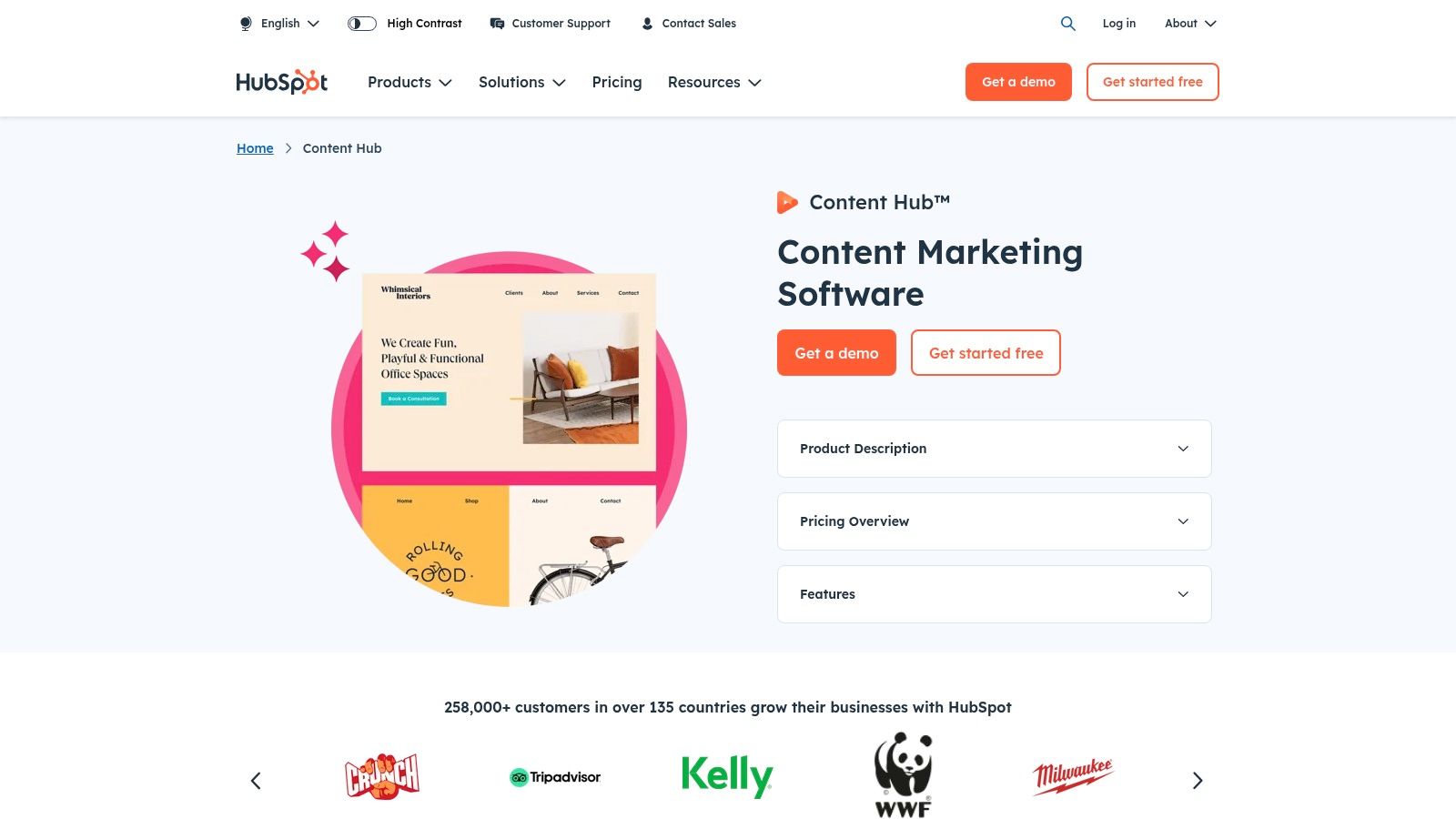
The platform includes a drag-and-drop editor, robust blogging tools, and built-in SEO recommendations to help you rank. With features like smart content, you can show different website visitors tailored content based on their CRM data. While there is a free tier to get started, accessing the more advanced features and removing HubSpot branding requires a paid plan, and the seat-based pricing can become costly as your team grows.
Key Considerations
- Best For: Service-based businesses and B2B companies focused on content marketing, lead generation, and building a fully integrated marketing and sales pipeline.
- Not Ideal For: Businesses needing complex ecommerce functionality, as its native capabilities are limited compared to dedicated platforms.
- Pricing: Starts with a free plan. Paid tiers unlock advanced features and are based on subscription levels and the number of "core seats" you need.
HubSpot’s unified platform provides unparalleled insights into how your content drives customer acquisition, making it a strategic choice for data-driven small businesses looking to scale their marketing efforts efficiently.
Website: https://www.hubspot.com/products/content
9. Duda
Duda is a professional website builder that has carved out a niche as a strong contender for the best cms for small business, particularly for agencies, freelancers, and SaaS platforms that build and manage sites for clients. It combines a powerful drag-and-drop editor with robust team collaboration and client management features, making it incredibly efficient for creating high-performing, responsive websites at scale. Its core advantage is its white-labeling capability, allowing agencies to present the platform as their own.
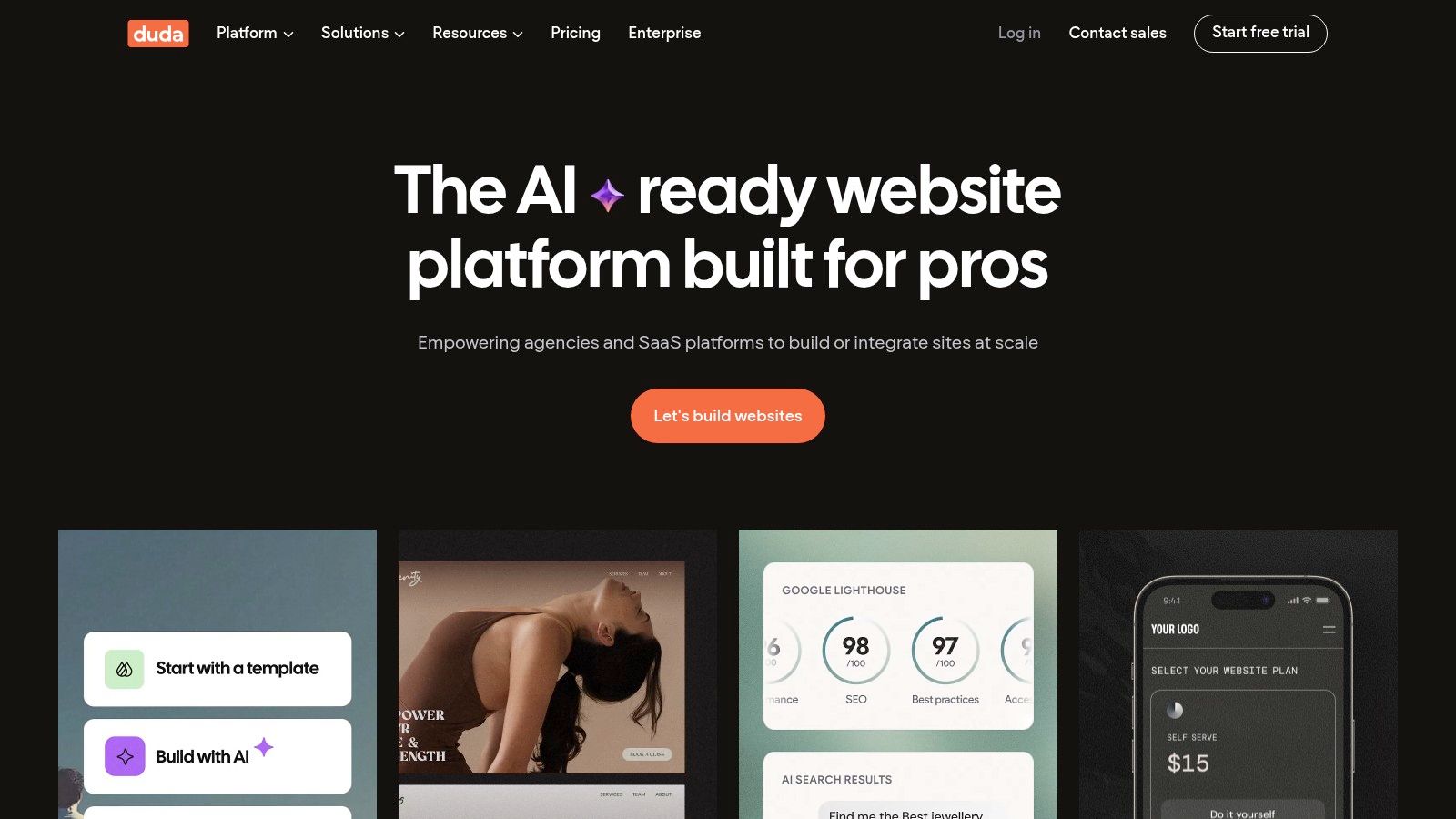
The platform is fully hosted on reliable AWS infrastructure, ensuring excellent uptime and performance without requiring technical maintenance from the user. While it offers optional ecommerce add-ons, its primary strength lies in its efficient site-building workflow and client-facing tools. Pricing is structured in tiers, with the best value unlocked when managing multiple client websites under a single account, making it a scalable solution for growing digital agencies.
Key Considerations
- Best For: Web design agencies, freelancers, and businesses managing multiple client websites who need efficiency and white-label branding.
- Not Ideal For: Single-site owners or DIY small businesses looking for a free or very low-cost entry point.
- Pricing: Subscription-based plans with no free tier. Ecommerce functionality is available as a paid add-on.
Duda's focus on structured data, site speed, and a streamlined client approval process makes it a professional-grade tool designed for efficiency and scalability.
Website: https://www.duda.co
10. Square Online (by Square; formerly Weebly)
Square Online emerges as a powerful contender for the best cms for small business, particularly for those already using or planning to use Square's payment ecosystem. Built on the foundation of Weebly, it offers a fully integrated solution for businesses that blend online sales with in-person transactions. Its core advantage is the seamless synchronization between your website, inventory, sales, and Square's renowned Point of Sale (POS) system, creating a single, unified command center for your entire operation.
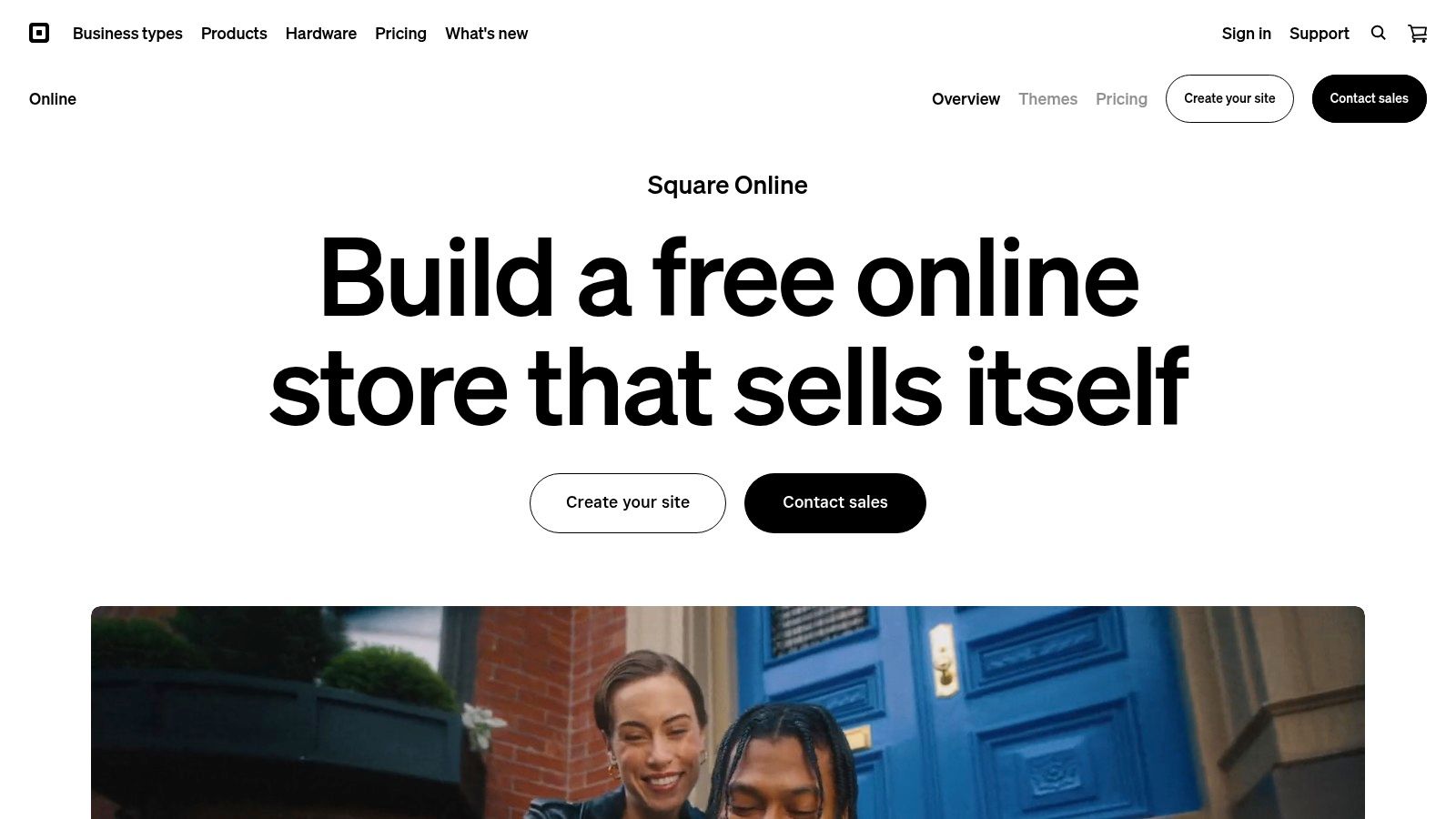
The platform is designed for rapid deployment, allowing restaurants, retailers, and service providers to get online quickly. It supports various fulfillment options like curbside pickup and local delivery, which are essential for modern local commerce. The free plan is a significant draw, letting businesses start selling online with no monthly fees, paying only transaction costs.
Key Considerations
- Best For: Local retailers, restaurants, and service-based businesses that need a cohesive online and offline sales system.
- Not Ideal For: Large-scale ecommerce stores with complex product catalogs or those needing extensive third-party app integrations.
- Pricing: Free plan available (pay only processing fees). Paid plans unlock more features and lower transaction rates.
Square Online simplifies operations by bundling website hosting, an online store, payment processing, and appointment scheduling into one package. This all-in-one approach is ideal for owners who value simplicity and efficiency over endless customization options.
Website: https://squareup.com/online-store
11. Ghost(Pro)
Ghost(Pro) presents itself as a powerful, modern alternative in the search for the best cms for small business, particularly for those focused on publishing. It's a fully managed platform built for professional creators, bloggers, and newsletter publishers who want to build a business around their content. Its core strength is a minimalist, distraction-free writing interface combined with robust built-in tools for memberships and paid subscriptions.
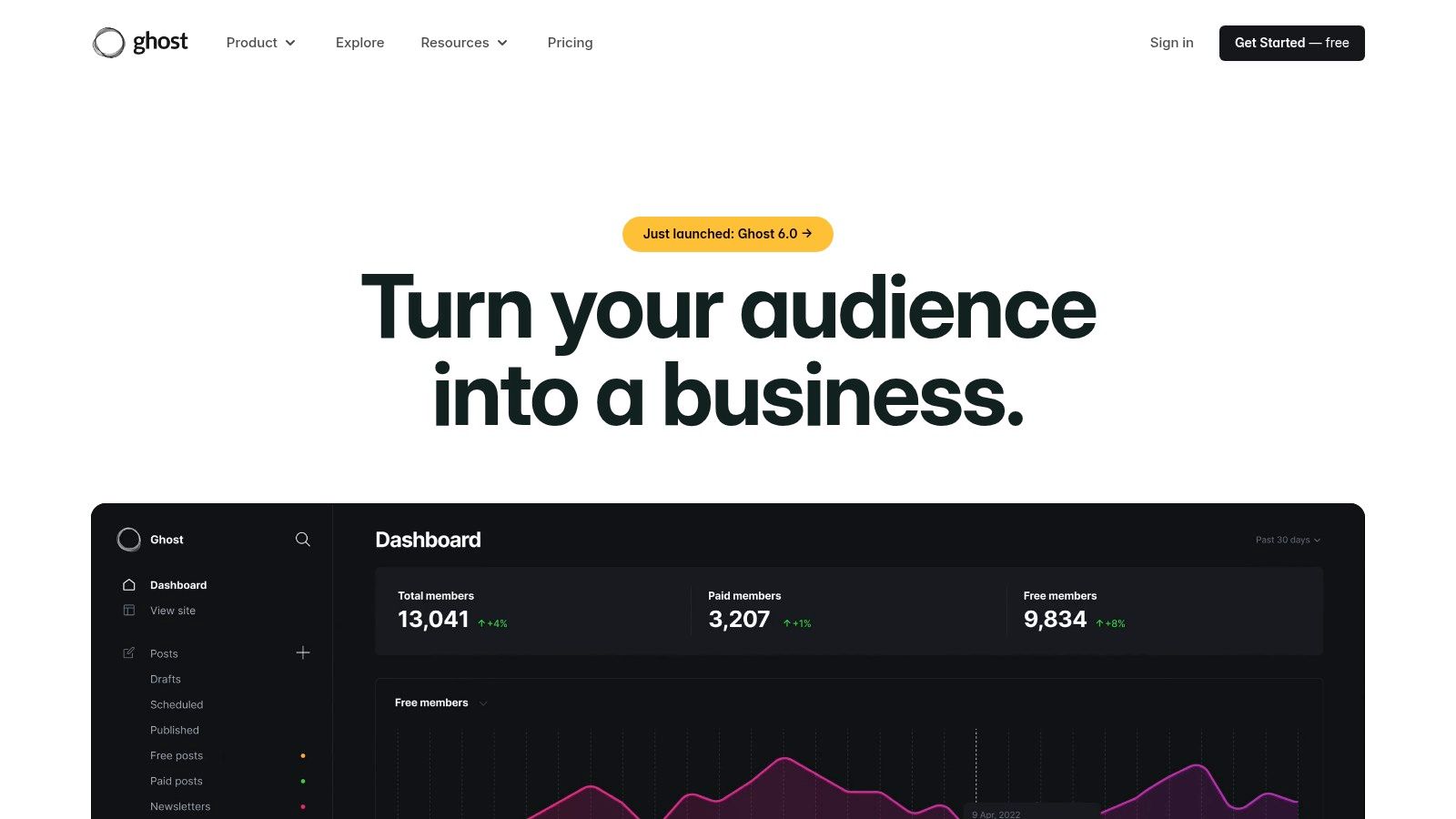
The platform is designed for speed and simplicity, ensuring your content is delivered quickly and is SEO-friendly right out of the box. Unlike more complex systems, Ghost allows you to focus purely on creating and monetizing your work through gated content and email newsletters without needing third-party plugins. Pricing is tiered based on the size of your audience (number of members), starting around $9/month for the Starter plan.
Key Considerations
- Best For: Independent publishers, bloggers, and journalists who want to build a membership or paid newsletter business.
- Not Ideal For: Businesses needing traditional ecommerce for physical products or highly complex, feature-heavy corporate websites.
- Pricing: Tiered monthly subscription plans based on audience size, with 0% transaction fees on payments.
Ghost’s open-source foundation provides a level of freedom and data ownership not always found in proprietary systems. Its clean interface and focus on content make it a compelling choice for creators who prioritize writing and community building over complex site management.
Website: https://ghost.org
12. G2 Web Content Management Category
When the sheer number of options feels overwhelming, a trusted review aggregator can be an invaluable tool. G2's Web Content Management category serves as a powerful research hub, making it a crucial resource for finding the best cms for small business based on real user experiences. It's not a CMS itself but a comprehensive marketplace where you can compare platforms using crowdsourced reviews, detailed feature grids, and up-to-date satisfaction ratings.
The platform allows you to filter CMS options specifically for small businesses, comparing them side-by-side on features, pricing models, and implementation time. This helps you move beyond marketing claims and see how each system performs in the real world for companies of your size. While vendors can encourage reviews, the volume of feedback provides a balanced perspective for your due diligence process.
Key Considerations
- Best For: Small business owners in the research phase who want to shortlist CMS candidates based on unbiased user reviews and direct comparisons.
- Not Ideal For: Those who have already chosen a CMS and are looking for implementation guides or support.
- Pricing: Free to access and use for research purposes.
G2 excels at helping you create a data-backed shortlist before committing to demos. Its leaderboards and comparison tools cut through the noise, highlighting platforms that consistently satisfy users with similar needs and operational scales.
Website: https://www.g2.com/categories/web-content-management
Top 12 CMS for Small Business Comparison
| Platform | Core Features/Characteristics | User Experience & Quality ★ | Value Proposition 💰 | Target Audience 👥 | Unique Selling Points ✨ |
|---|---|---|---|---|---|
| Shopify | Hosted ecommerce, POS, multichannel sales | ★★★★☆ 24/7 support, scalable | 💰 Mid - app/theme fees, transaction fees | 👥 Small product-based businesses | 🏆 Fast launch, excellent checkout |
| Wix | Drag-drop + AI design, ecommerce, SEO | ★★★☆☆ Beginner-friendly, fast | 💰 Low - free plan, add-ons can raise cost | 👥 Small services, portfolios | ✨ AI-assisted site building |
| Squarespace | Polished design, commerce, marketing tools | ★★★★☆ Design-centric, solid support | 💰 Mid - no free plan, payment fees | 👥 Design-focused small businesses | 🏆 High-quality templates |
| WordPress.com | Managed hosting, WooCommerce, AI site builder | ★★★★☆ Strong performance & security | 💰 Mid - plugin limits on lower plans | 👥 Bloggers to ecommerce shops | ✨ AI builder, managed security |
| WordPress.org (self-hosted) | Open-source, full code access, 50k+ plugins | ★★★★☆ Unlimited customization | 💰 Low - free core, hosting costs | 👥 Developers & advanced users | 🏆 Maximum flexibility |
| Webflow | Visual designer, CMS collections, managed hosting | ★★★★☆ Pixel-level control | 💰 Mid-high - workspace pricing | 👥 Small businesses wanting custom design | ✨ Designer-grade with clean code export |
| BigCommerce | Ecommerce-first, multi-channel sales, no extra fees | ★★★★☆ Enterprise features | 💰 Mid-high - tiered plans linked to sales | 👥 SMBs scaling ecommerce | 🏆 No platform payment fees |
| HubSpot Content Hub | CMS + CRM + marketing stack | ★★★★☆ Personalization, 24/7 support | 💰 Mid-high - seat-based pricing | 👥 Small businesses focused on growth | ✨ All-in-one CMS & CRM |
| Duda | Drag-drop, white-label, team/client management | ★★★☆☆ Agency-focused, reliable | 💰 Mid - no free plan, ecommerce add-ons | 👥 Agencies, freelancers | ✨ White-label & client collaboration |
| Square Online | Ecommerce + Square POS, inventory syncing | ★★★☆☆ Simple setup, unified system | 💰 Low-mid - free plan, processing fees | 👥 Local retailers & service businesses | 🏆 POS-integrated ecommerce |
| Ghost(Pro) | Blogging, memberships, distraction-free | ★★★★☆ Lightweight & SEO-friendly | 💰 Mid - managed hosting with monetization | 👥 Content-driven businesses & newsletters | ✨ Membership & content gating |
| G2 Web Content Management | Reviews, comparisons, crowdsourced ratings | ★★★★☆ Real user feedback | 💰 Free | 👥 Buyers shortlisting CMS platforms | ✨ Up-to-date leaderboards & filters |
Making Your Final Choice: Partnering for Success
We've explored a comprehensive landscape of content management systems, from powerful ecommerce engines like Shopify to design-centric platforms such as Webflow and the ultimate customizability of WordPress.org. The journey to selecting the best CMS for your small business isn't about finding a single "perfect" platform; it's about identifying the one that aligns most effectively with your unique business model, technical comfort level, and long-term growth strategy.
Making this choice is a foundational business decision. Your CMS is more than just a website builder; it's the digital headquarters for your marketing, sales, and customer engagement efforts. Getting it right means empowering your team, streamlining operations, and creating a seamless experience for your audience.
A Quick Recap for Strategic Decision-Making
To crystallize your thinking, let’s revisit the core strengths of the top contenders:
- For Direct-to-Consumer Ecommerce: Shopify and BigCommerce are purpose-built powerhouses. They offer robust, scalable solutions with integrated payment processing, inventory management, and extensive app marketplaces designed specifically for selling products online.
- For Simplicity and Stunning Design: Wix and Squarespace excel here. They are ideal for service-based businesses, portfolios, and blogs where visual appeal and ease of use are paramount. Their all-in-one nature removes technical hurdles.
- For Ultimate Control and Scalability: WordPress.org remains the undisputed king of customization. If you need a completely unique design, specific functionality, or want to own your data outright, this is your platform. However, it demands greater technical responsibility.
- For Marketing-Driven Growth: HubSpot Content Hub integrates your website directly into a world-class CRM and marketing automation suite. It's the best choice for businesses whose primary goal is lead generation and content marketing at scale.
Your Actionable Next Steps
Feeling confident about your direction? Here's how to move forward and make your final decision.
- Define Your Non-Negotiables: List the 3-5 absolute must-have features. Is it an integrated booking system? Advanced SEO tools? A specific payment gateway? Use this list to immediately disqualify platforms that don't meet your core needs.
- Trial and Test: Nearly every platform on our list offers a free trial or a limited free plan. Sign up for your top two or three contenders. Spend a few hours building a test page, adding a product, or writing a blog post. This hands-on experience is invaluable and will reveal more than any review ever could.
- Project Your 3-Year Growth: Consider where you want your business to be in three years. Will you be adding a subscription service, expanding internationally, or launching a membership community? Ensure your chosen CMS can grow with you, either natively or through integrations. The best CMS for a small business is one that won't hold you back tomorrow.
Choosing your CMS is a commitment, but it's also an exciting step toward building a powerful digital presence. By aligning the platform's strengths with your business's core objectives, you're not just selecting a tool; you're choosing a strategic partner for your future success.